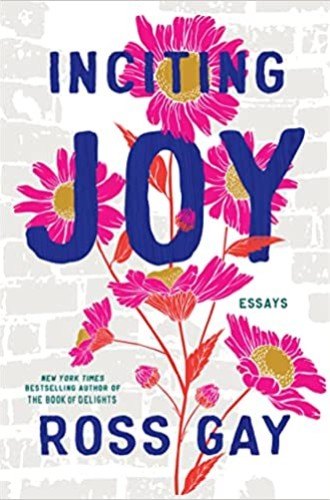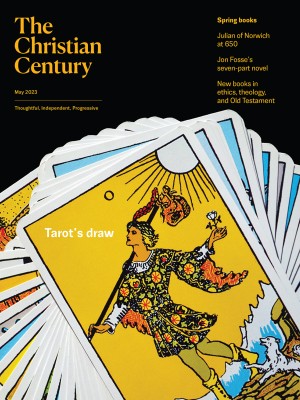Can the heat of a world on fire ignite seeds of joy?
Ross Gay’s new essay collection explores the revolutionary tactics of delight.
Poet Ross Gay writes about things we believe are not serious enough to save us. Inciting Joy was inspired by a series of conversations in response to his practice of writing daily about what delights him—the product of which was his bestseller The Book of Delights. “I didn’t know you could write about joy,” said a crying woman in her late 60s in Gay’s book signing line. “I have always been told that you can’t write about joy because it’s not serious,” marveled an undergraduate at a reading. “When all this is going on,” chided a fellow professor, indicating all the troubles of the world, “why would you write about joy?”
Because joy is the seed germinating within all things, unlocked by the heat and pressure of our world on fire. That’s one of the many metaphors Gay uses as he meditates on how we overlook joy by trying to make it into something it is not—pure and unadulterated, commodified as serenity or pleasure, or disconnected from real life, real bodies, and real emotions. “What if joy, instead of refuge or relief from heartbreak,” he asks in the first chapter, “is what effloresces from us as we help each other carry our heartbreaks?”
Read our latest issue or browse back issues.
Gay calls each essay an “incitement,” conjuring the revolutionary tactics joy engages as it emerges in the midst of our entanglement with suffering, sorrow, and systems of oppression. Joy uncovers a human resiliency that stems from the interdependence and connection of living things. It is when we escape the mastering mentality of what Gay calls the brutal economy that joy inspires us and we incite more joy in others. Gay is a former college athlete, a coach, a poet, a teacher, and a person who understands how much his relationships shape him—especially his parents’ interracial union and his own. He draws on the ways that pickup basketball, community gardens, reading poetry aloud, listening to great artists cover songs of other greats, laughing, crying, just hanging out, and caring for the dying loose the shackles of capitalism’s productivity and White supremacy’s puritanical mindset to “rejoyn” us to gracious and life-giving ways of being.
When I heard Gay read from this book at our public library, he called his religious background “scant.” He cited the motley influences of a beloved aunt—a Jehovah’s Witness who encouraged both his writing poems and his cursing—and a habit he developed later in life of sitting in the Buddhist temple wherever he lives. Although joy is a topic that some philosophers and theologians of the past have taken seriously, Gay does not reference such sources in this book. Instead, he favors comedians like Richard Pryor, musicians like Nina Simone, his buddies (whom he calls only by their first names), and American poets: Emily Dickinson, Walt Whitman, Audre Lorde, and Lucille Clifton. Yet Inciting Joy is deeply theological for those who long for language capable of uncovering beauty, truth, and joy when their houses of worship feel stuck, shallow, or shaming.
In Gay’s contemplations of joy, we see images, practices, and echoes of Christianity (among other perennial wisdoms) enlivened by the secularity of their contexts. Reading this collection slowly like a devotional, we hear invocations of “but by your kindness” rather than “but by His Goodness” and apocalyptic images of the barons of capitalism as “makers of the ends of the earth.” Such turns interrupt our traditional phrases and associations with whose world we live in and whose power it is to fix it—or rather, as Gay says, to “unfix it,” since etymologically “to fix” can mean “to repair,” “to pin down,” or “to kill.” Joy liberates us from our fixations—whether they be personal anxieties or systemic social issues.
As he touches on our relationship to time, Gay describes an almost liturgical way of healing it. He talks about how poetry, potent in its impotency, can stop the brutal pace of time that we experience as cogs in capitalism’s wheel. The liminal practice of reading “lines, which are actually breaths,” describes what Christians are doing when we pray together. When we deliver verses at the “pace and . . . tempo of our bodies lit with our dying,” we understand just how Sunday worship restores our human relationship with time—wrenching it from the obsession with productivity and progress that drives consumer capitalism. Liturgy, like poetry, “might make nothing happen. . . . Inside of which anything can happen.”
Perhaps the strongest similarity between Gay’s examples and what happens in and through faith communities comes through his description of what it is like to serve on the board of an urban orchard. Gay grapples with what it feels like to spend so much time in planning for and planting trees whose fruit many of its board members will never see. “It felt like a vocation, like we were being called together . . . which maybe explains our tolerance of, or even pleasure at, if not need for, long-ass board meetings, always with food. . . . Breaking bread, it turned out, was one of the most important things we were doing.” The perpetual potlucks were what he calls preparation and practice for something beyond productivity:
The inefficiency, the incompetence, the ineffectiveness, the dismal rate of production, the off-taskness, the wandering, the flabbiness, the consensussing, the play, the listening, the dreaming, were all just ways of being together. It was hanging out, it was growing closer, it was mycelial, its product was itself, its product was connection, friendship, it was care . . . that was the product, which is to say the product was our needs offered to each other, held to each other, held by each other.
I can think of no better description of what church can be—called to keep the sabbath, to witness to the coming realm of supreme love, and to love one another in the meantime. It can interrupt the systems and mentalities that dehumanize us, slow time down in order to allow us to find meaning and hope, and give us a context in which to offer our need to be held by one another.
Through these 14 incitements, Gay joins writers from Plato to C. S. Lewis who have imagined joy as longing or incompleteness in the most exhilarating and liberating form. Joy, whether its ponderer’s leanings are more theistic or humanistic, is the emotion that strips us of the delusion of independence and reveals the connection and mutuality in which we live, move, and have our being.







